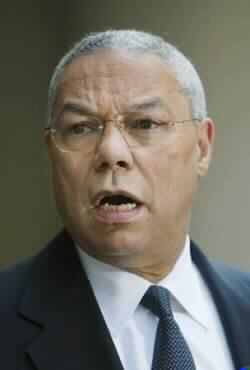HIGHLIGHTS: 'For Arafat, the Presidency is a Mission Not a Post,' Palestinian UN Representative|| Egypt Stands by Arafat||Washington Abandons Call for Mideast Conference for Now||STORY: The Bush administration warned the Palestinians on Sunday they would cloud their prospects for nationhood by re-electing Yasser Arafat as their leader.
The Palestinian's U.N. envoy responded that Arafat probably will run in January's scheduled election and, as leader of a continuing liberation movement, will win if he does.
"For him, and I think for many Palestinians as well, it is matter of a mission rather than a post," said Nasser al-Kidwa, the Palestinians' U.N. observer. "His mission is to lead the Palestinian people until the establishment of independent Palestine."
The administration also got a jolt Sunday from Egypt, the first Arab state to make peace with Israel and a major U.S. ally in the Middle East.
After President Hosni Mubarak met with a U.S. Senate delegation and separately with senior Arafat aide Saeb Erekat, Egyptian Foreign Minister Ahmed Maher said: "Egypt strongly supports the democratically elected Palestinian leadership and refuses any attempt to outflank it." He said Arafat was democratically elected in 1996, and "next year's elections announced by Arafat will also prove so."
Both Secretary of State Colin Powell and Condoleezza Rice, President Bush's national security adviser, made tours of the Sunday television talk shows expanding on Bush's speech last week laying down U.S. policy for resumption of a Palestinian-Israeli peace process.
"If they don't bring in new leaders, then we shouldn't expect new approaches," Secretary of State Colin Powell said on "Fox News Sunday." Before the election, he said, the United States plans to work "to help other Palestinian leaders to rise up and to begin transformation within the Palestinian community."
Speaking on CBS' "Face the Nation," Powell said he told Arafat two months ago, inside the Palestinian's bunker surrounded by Israeli armor and soldiers, that "when this siege is over, you have got to move in a new direction or we will not be able to continue to try to help you."
By ignoring the admonition, Powell said, Arafat forced Bush's hand.
In January, Powell said, the Palestinians "have the right to elect whoever they wish to, and we have the right and the ability to determine how we will deal with those circumstances." Should the Palestinians vote Arafat back to power, "then they ought to understand the consequences," Powell said.
He also said the administration has abandoned for now its idea of an international conference of foreign ministers on the Middle East this summer. Considering current levels of violence and Israel's continuing military operations in the Palestinian areas, and the U.S. decision to abandon Arafat, "it is appropriate right now not to talk about a conference," Powell said.
Rice, appearing on NBC's "Meet the Press," said the administration at least would end any financial support of Arafat's Palestinian Authority if he remains in power.
"We are not trying to pick the leadership of the Palestinian people, but we are saying that there are consequences," Rice said. "How can you work with a leadership that on one hand says it wants the peace process and on the other hand continues to work with terrorists who are undermining the peace process?"
"The United States of course will respect democratic processes. But the fact is that if a leadership emerges that will not deal with the problem of terrorism, the United States can do nothing to move this process forward," Rice said.
Also on NBC, Palestinian diplomat al-Kidwa indicated that once an independent Palestine exists, the U.S. goal of getting rid of Arafat might be reachable.
After independence, al-Kidwa said, the question of Arafat's future "will be very legitimate, because many Palestinians also think that he might not be the man to build all of the institutions of a state.
"But we are still in the phase of national liberation, and I think he symbolizes the ambitions of the Palestinian people during this stage. As such, I think they will stand by him."
PHOTO CAPTION
Secretary of State Colin Powell addresses members of the media after taping ABC's news program "This Week" Sunday, June 30, 2002, in Washington. Powell said the United States would not keep dealing with Palestinian leader Yasser Arafat and that the Palestinian people must realize what is at stake. (AP Photo/Pablo Martinez Monsivai
- Author:
& News Agencies - Section:
WORLD HEADLINES


 Home
Home Discover Islam
Discover Islam Quran Recitations
Quran Recitations Lectures
Lectures
 Fatwa
Fatwa Articles
Articles Fiqh
Fiqh E-Books
E-Books Boys & Girls
Boys & Girls  Women
Women










